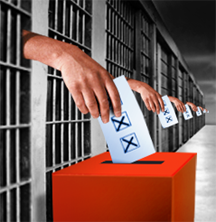In the United States, as many as 23 million citizens have felony convictions and their lack of money is keeping many of them from voting. In 2019, at least 30 states continue to disenfranchise some of these citizens based on their wealth according to a new report released by the Campaign Legal Center (CLC) and Georgetown Law’s Civil Rights Clinic. Additionally, an estimated 10 million Americans owe more than $50 billion in fines and fees related to criminal convictions.
“Wealth should never be a determining factor in an American’s ability to participate in the electoral process,” says Danielle Lang, co-director of voting rights and redistricting at CLC. To help people in all 50 states to learn about the path to voting rights restoration, CLC has launched RestoreYourVote.org.
Felony disenfranchisement laws and poll taxes, both relics of the Jim Crow era, emerged as ways to disenfranchise African Americans. Today, like when they were created, the hurdles created by these policies disproportionately disenfranchise communities of color, poor whites, Native Americans, and other marginalized communities.
In Florida, Governor Ron Desantis recently signed a measure requiring people with felony convictions to pay all court-ordered restitution, fines, and fees before they are allowed to vote. This was after 64 percent of Florida voters passed Amendment 4 to restore voting rights for people convicted of felonies as long as they have completed their sentences, though it excludes people convicted of murder or felony sex offenses.
30 States Deny Right to Vote to Citizens Based on Wealth, New Report Finds

According to the report:
Florida and 7 other states explicitly condition voting rights restoration of formerly incarcerated individuals on the payments of fines and fees: Alabama, Arizona, Arkansas, Connecticut, Georgia, Tennessee, and Washington.
20 states do so implicitly: Alaska, California, Delaware, Idaho, Kansas, Louisiana, Minnesota, Mississippi, Missouri, Nebraska, New Jersey, New Mexico, North Carolina, South Carolina, South Dakota, Texas, Virginia, West Virginia, Wisconsin, and Wyoming.
2 states permanently disenfranchise convicted individuals require payment of fines and fees for clemency eligibility: Iowa and Kentucky.
20 states and the District of Columbia do not condition the right to vote on the payment of fines and fees.
Florida and 7 other states explicitly condition voting rights restoration of formerly incarcerated individuals on the payments of fines and fees: Alabama, Arizona, Arkansas, Connecticut, Georgia, Tennessee, and Washington.
20 states do so implicitly: Alaska, California, Delaware, Idaho, Kansas, Louisiana, Minnesota, Mississippi, Missouri, Nebraska, New Jersey, New Mexico, North Carolina, South Carolina, South Dakota, Texas, Virginia, West Virginia, Wisconsin, and Wyoming.
2 states permanently disenfranchise convicted individuals require payment of fines and fees for clemency eligibility: Iowa and Kentucky.
20 states and the District of Columbia do not condition the right to vote on the payment of fines and fees.
Advertisers | Contact Us | Events | Links | Media Kit | Our Company | Payments Pier
Press Room | Print Cover Stories Archives | Electronic Issues and Talk Radio Archives | Writer's Guidelines






